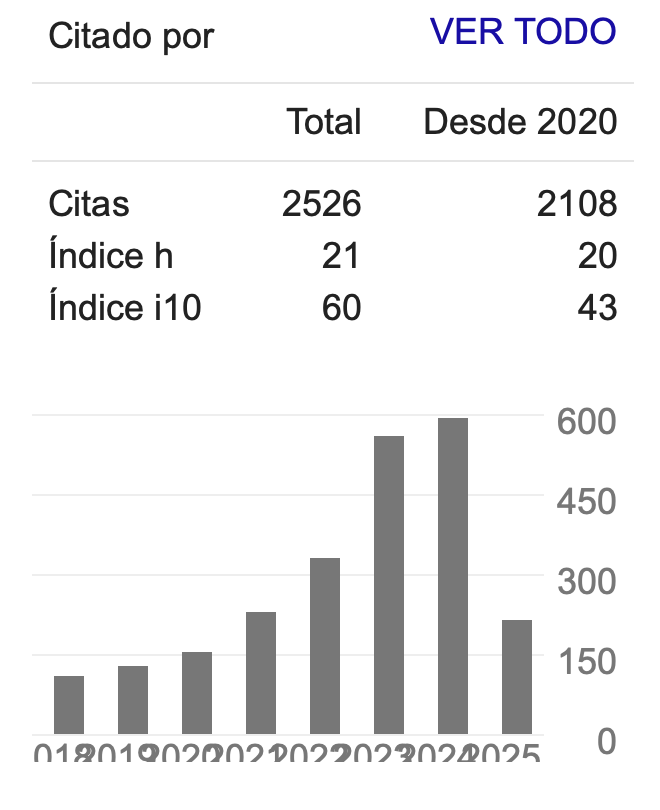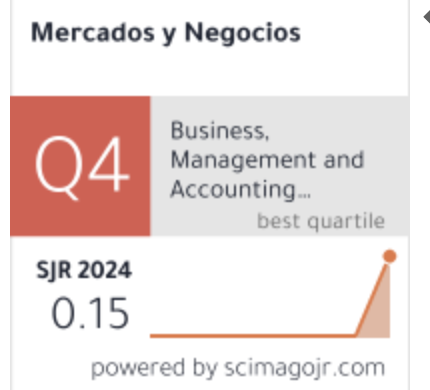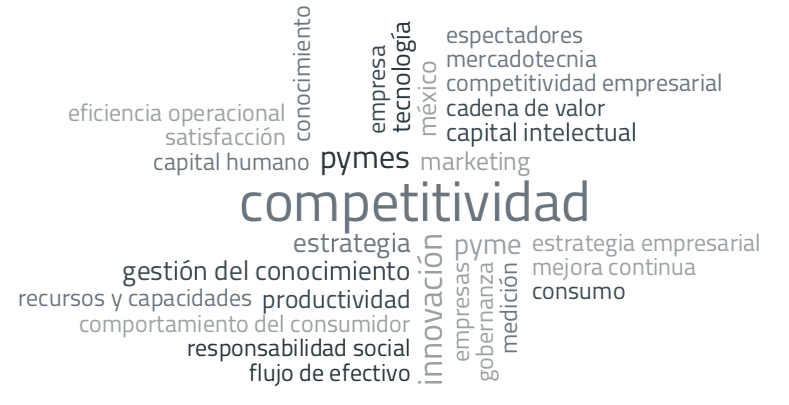La responsabilidad social y los impactos que influyen en la competitividad de las pymes manufactureras de Guadalajara
DOI:
https://doi.org/10.32870/myn.v0i30.5272Abstract
La responsabilidad social corporativa (Rsc) es el rol que le toca desempeñar a las empresas a favor del desarrollo sostenible, es decir, a favor del equilibrio entre el crecimiento económico, el bienestar social y el aprovechamiento de los recursos naturales y el medio ambiente. Este equilibrio es vital para la operación de los negocios. Las empresas deben pasar a formar parte activa de los retos que tienen como parte de la sociedad, por su propio interés de tener un entorno más estable y próspero. Por lo tanto, el enfoque que se pretende en el siguiente trabajo es la Rsc dentro de las pymes manufactureras de la zona metropolitana de Guadalajara y los efectos que produce en la competitividad, para obtener empresas más productivas, competitivas y con mejor posicionamiento internacional. Lo anterior se comprobó mediante el uso de un instrumento de medición (escala de Likert) cuyos resultados fueron analizados mediante los softwares spss y eqs.References
Ali, I., Rehman, K. U., Ali, S. I., Yousaf, J., & Zia, M. (2010). Corporate social responsibility influences, employee commitment and organizational performance. African Journal of Business Management, 4(13), 2796.
Allouche, J., & Laroche, P. (2006). La relación entre las empresas responsabilidad social y desempeño corporativo financiero: un estudio.Allouche, J. Responsabilidad social corporativa: actuaciones y las partes interesadas. Palgrave MacMillan, 3-40.
Andersen, H. C. (2008). Employer attractiveness: what effect does CSR have, and how can organizations become attractive to Norwegian business students?.
Barney, J. (1991). Recursos de la empresa y ventaja competitiva sostenida.Journal of Management, 17(1), 99-120.
Bear, S., Rahman, N., & Post, C. (2010). The impact of board diversity and gender composition on corporate social responsibility and firm reputation.Journal of Business Ethics, 97(2), 207-221.
Bendixen, M., & Abratt, R. (2007). Corporate identity, ethics and reputation in supplier–buyer relationships. Journal of Business Ethics, 76(1), 69-82.
Bernal Torres, C. A. (2006). Metodología de la investigación para administración, economía, humanidades y ciencias sociales.
Bernal, C. A. (2010). Metodología de la investigación: administración, economía, humanidades y ciencias sociales.(3 Edic.). Colombia: Prentice Hall, 160-161.
Bertram, D. (2007). Likert Scales… are the meaning of life: CPSC 681–Topic Report.
Brammer, S., Brooks, C., & Pavelin, S. (2006). Corporate social performance and stock returns: UK evidence from disaggregate measures. Financial management, 35(3), 97-116.
Brine, M., Brown, R., & Hackett, G. (2007). Corporate social responsibility and financial performance in the Australian context. Economic Round-up, (Autumn 2007), 47.
Caneda, M. C. (2004). La responsabilidad social corporativa interna: la" nueva frontera" de los recursos humanos. Esic Editorial.
Carroll, A. B. (1979). A three-dimensional conceptual model of corporate performance. Academy of management review, 4(4), 497-505.
Castillo Clavero, A. M. (1986). La responsabilidad de la empresa en el contexto social: su articulación, gestión y control (tesis doctoral). Universidad de Málaga, Málaga.
Chand, M., & Fraser, S. (2006). The relationship between corporate social performance and corporate financial performance: Industry type as a boundary condition. The Business Review, 5(1), 240-245.
Cochran, P. L., & Wood, R. A. (1984). Corporate social responsibility and financial performance. Academy of management Journal, 27(1), 42-56.
David, P., Kline, S., & Dai, Y. (2005). Corporate social responsibility practices, corporate identity, and purchase intention: A dual-process model. Journal of Public Relations Research, 17(3), 291-313.
D’Cruz, J., & Rugman, A. (1992). New concepts for Canadian competitiveness.Kodak, Canada, 1-60.
Dodd, M. D. (2010, March). Who Really Cares about Ethics? Corporate Social Responsibility and Consumer Purchase Intention. In 13 TH INTERNATIONAL PUBLIC RELATIONS RESEARCH CONFERENCE (p. 252).
Drucker, P. F. (1984). Converting social problems into business opportunities: The new meaning of corporate social responsibility. California management review, 26(2), 53-63.
Flatt, S. J., & Kowalczyk, S. J. (2006, May). Corporate reputation as a mediating variable between corporate culture and financial performance. InSubmitted to 2006 Reputation Institute Conference as Academic Paper.
Freeman, R. E. (1994). The politics of stakeholder theory: Some future directions. Business ethics quarterly, 4(04), 409-421.
Friedman, M. (1970). The social responsibility of business is to increase its profits. New York, 122-124.
Gómez García, F. (2008). Responsabilidad social corporativa y performance financiero: treinta y cinco años de investigación empírica en busca de un consenso. Principios: estudios de economía política, (11), 5-22.
Griesse, M. A. (2007). The geographic, political, and economic context for corporate social responsibility in Brazil. Journal of Business Ethics, 73(1), 21-37.
Hair, J. F., Anderson, R. E., & Tatham, R. L. (7). Black, WC (1995) Multivariate Data Analysis with Readings.
Hamel, G. P., & Prahalad, C. K. (2005). CK 1989. Strategic intent. Harvard Business Review, (3).
Kay, J. (1993). Foundations of corporate success Oxford University Press.
Keinert, C. (2008). Corporate social responsibility as an international strategy. Springer Science & Business Media.
Kramer, M. R., & Porter, M. E. (2006). Estrategia y sociedad: el vínculo entre ventaja competitiva y responsabilidad social corporativa. Harvard Business Review, 84(12), 42-56.
Margolis, J. D., & Walsh, J. P. (2001). People and profits?: The search for a link between a company's social and financial performance. Psychology Press.
McWilliams, A., & Siegel, D. (2001). Corporate social responsibility: A theory of the firm perspective. Academy of management review, 26(1), 117-127.
Mellahi, K., Morrell, K., & Wood, G. (2010). The ethical business: Challenges and controversies. Palgrave Macmillan.
Miles, M. P., & Covin, J. G. (2000). Environmental marketing: A source of reputational, competitive, and financial advantage. Journal of business ethics,23(3), 299-311.
Mohr, L. A., & Webb, D. J. (2005). The effects of corporate social responsibility and price on consumer responses. Journal of Consumer Affairs, 39(1), 121-147.
Montgomery, D. B., & Ramus, C. A. (2007). Including corporate social responsibility, environmental sustainaibility, and ethics in calibrating MBA job preferences.
Munch, L., & Angeles, E. (2009). Metodos y tecnicas de investigacion.
Orlitzky, M., Schmidt, F. L., & Rynes, S. L. (2003). Corporate social and financial performance: A meta-analysis. Organization studies, 24(3), 403-441.
Pirson, M. A., & Lawrence, P. R. (2010). Humanism in business–towards a paradigm shift?. Journal of Business Ethics, 93(4), 553-565.
Portales, L., & García, C. (2012). Evolución de la responsabilidad social empresarial: nacimiento, definición y difusión en América Latina. Raufflet, E.; Lozano, J.; Barrera, E. y García, C.(2012). Responsabilidad Social Empresarial. México: Pearson, 1.
Porter, M. E., & Kramer, M. R. (2002). The competitive advantage of corporate philanthropy. Harvard business review, 80(12), 56-68.
Porter, M. E., & Van der Linde, C. (1995). Toward a new conception of the environment-competitiveness relationship. The journal of economic perspectives, 9(4), 97-118.
Ramasamy, B., Yeung, M., & Yuan, Y. (2008). The role of corporate social responsibility (CSR) in job choice decisions in the greater China region. In EU-CHINA BMT conference papers and proceedings, the 2nd World Business Ethics Forum (pp. 1-24).
Rettab, B., Brik, A. B., & Mellahi, K. (2009). A study of management perceptions of the impact of corporate social responsibility on organisational performance in emerging economies: the case of Dubai. Journal of Business Ethics, 89(3), 371-390.
Russ, J. (1999). Léxico de filosofía (Vol. 2). Ediciones AKAL.
Russo, M. V., & Fouts, P. A. (1997). A resource-based perspective on corporate environmental performance and profitability. Academy of management Journal, 40(3), 534-559.
Sánchez, J. L. F., & Sotorrío, L. L. (2007). The creation of value through corporate reputation. Journal of Business Ethics, 76(3), 335-346.
Schreck, P. (2009). The business case for corporate social responsibility.Understanding and Measuring Economic Impacts of Corporate Social Performance (Physica-Verlag, Heidelberg).
Sethi, S. P. (1975). Dimensions of corporate social performance: An analytical framework. California management review, 17(3), 58-64.
Siegele, L., & Ward, H. (2007). Corporate Social Responsibility: A Step towards Stronger Involvement of Business in MEA Implementation?. Review of European Community & International Environmental Law, 16(2), 135-144.
Stawiski, S., Deal, J. J., & Gentry, W. (2010). Employee perceptions of corporate social responsibility. Center for Creative Leadership, Greensboro, NC.
Tsoutsoura, M. (2004). Corporate social responsibility and financial performance. Center for responsible business.
Turker, D. (2009). How corporate social responsibility influences organizational commitment. Journal of Business Ethics, 89(2), 189-204.
Van Beurden, P., & Gössling, T. (2008). The worth of values–a literature review on the relation between corporate social and financial performance. Journal of business ethics, 82(2), 407-424.
Vilanova, M., Lozano, M., & Arenas, D. (2009). Exploración de la Naturaleza de la relación entre la RSE y la competitividad. Journal of Business Ethics, 87, 57-69.
Wicklin, R. (2010). Statistical programming with SAS/IML software. SAS Institute.
Published
How to Cite
Issue
Section
License
Mercados y Negocios by Department of Mercadotecnia y Negocios Internacionales. University of Guadalajara is licensed under a License Creative Commons Attribution-NonCommercial 4.0 International.
The author retains the copyright.








